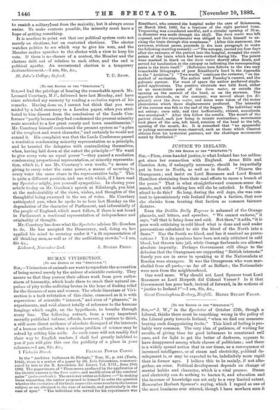[0 THE EDITOR OF THE "SPECTATOR. "] had the privilege of
hearing the remarkable speech Mr. Leonard Courtney, M.P., delivered here last Monday, and have since refreshed my memory by reading a verbatim, report of his remarks. Having done so, I cannot but think that you were misled by a bald summary in a London paper, when you attri- buted to him dissent from the conclusions of the Leeds Con- ference " partly because they had condemned the present minority seats accorded to a few great county and town constituencies." Mr. Courtney himself condemned the present system as " a plan of the roughest and worst character," and certainly he would not extend it. His complaint was that the Leeds Conference passed a resolution condemning minority representation as a principle, and he taunted the delegates with contradicting themselves, when, having laid down at the outset the principle—" We want to give every vote an equal power "—they passed a resolution condemning proportional representation, or minority representa- tion, which is, I use Mr. Courtney's own words, "a means of giving to every voter the same power, a means of securing to every voter the same share in the representative body." This is quite a different position, and one with which, if I have read my Spectator aright, you yourself sympathise. In closing your article to-day on Mr. Goschen's speech at Edinburgh, you hint at the undesirability of the views, wishes, and thoughts of the thoughtful being swamped in the sea of votes. Mr. Courtney anticipated you, when he spoke to us here last Monday on the degradation of the character of Parliament, and inferentially of the people of England, which must follow, if there is not found in Parliament a continual representation of independence and originality of thought.
Mr. Courtney has done what the Spectator advises Mr. Goschen to do. He has accepted the Democracy, and, doing so, has applied his mind to securing under it " a fit representation of all thinking men, as well as of the unthinking crowds."—I am, Sir SLc.,


































 Previous page
Previous page